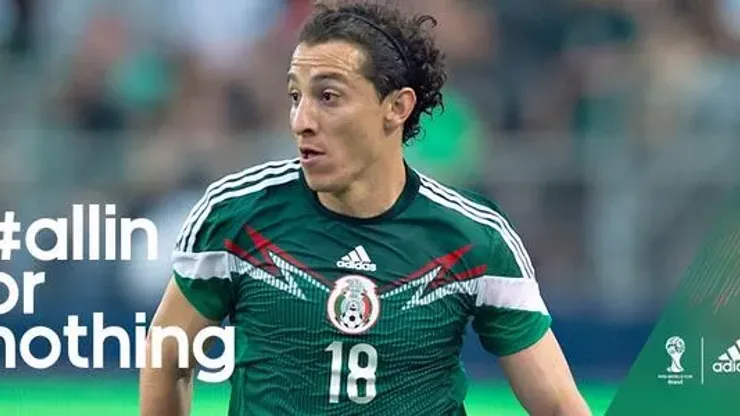Not so long ago, Andrés Guardado was the most notable Mexican in the club game. Given what’s happened over the last four years, the memory’s been relegated to a footnote, but the span is still there: A small window in the wake of Rafa Márquez’s fade at Barcelona and Pavel Pardo’s departure from Stuttgart where Guardado’s place in Spain made him as prominent as any Mexican player in Europe. I guess 2010 kind of a weird place, especially when you consider the Guardado of 2014.
Then, he was a prototypical winger. Four years later, a transition to left back has somehow ended with him in central midfield at the World Cup, a role in which he’s begun to excel. Playing in front of José Juan Vázquez and beside Héctor Herrera, the one-time winger has been the answer to Miguel Herrera’s injury crisis, putting in a group stage that’s allowed us to remember the promise he once held …
He was only 23, but he’d fully established himself. El Principito was the regular left winger at Deportivo La Coruña, a team that finished in the Primera’s top half three times in a row after Guardado arrived from Atlas. By the time Mexico went to South Africa 2010, Guardado was entering his second World Cup, had already accumulated 56 caps, and had positioned himself as an unlikely elder statesman for incoming Golden Generation. Consider age, production, talent, experience and potential, Guardado may have been the most valuable player in CONCACAF. Quietly, he was that good.
Just as quietly, Guardado had also become emblematic of El Tri – a program that was about to be humbled. He was talented, undoubtedly, but he was also flying under the global, carrying a potential that outstretched his renown. Like his national team, Guardado was ready to transcend perceptions but to succumb to the transition.
In 2011, as Mexico put in the most impressive Gold Cup in the history of the tournament, Guardado scored five times in 15 games. Only 24, his experience matches his promise, making him a model for players like Gio Dos Santos, Carlos Vela, Javier Hernández, Pablo Barrera and Efraín Juárez. By 2012, when Mexico entered World Cup qualifying, Guardado had earned his move to a bigger club, his goal-scoring after Coruña’s shock relegation earning him a chance at Valencia. It wasn’t Barcelona or Real Madrid, but Mexico weren’t quite ready to challenge Argentine or Brazil, either. The symbiosis prospered.
As qualifying reached its final rounds, that symbiosis turned into an illness. As Guardado struggled to score goals (finding net only once in the 27 games before the World Cup), El Tri’s attack dried up, too. Mexico spent most of CONCACAF’s six-team tournament in fourth or fifth, ultimately handed to the indignity of a playoff against New Zealand. By the end of qualifying, when illusions about transcending CONCACAF had faded, Mexico cycled through four coaches in six weeks.
As El Tri embraced its identity crisis, Guardado was handed one of his own. Once the prototypical left winger, the little prince was being shuffled to left back, from Valencia to Bayer Leverkusen. In the six months leading up to the World Cup, Guardado made only five appearances in Germany – only two in Bundesliga play. Three months shy of his 28th birthday, the star that ascended in Galicia was fading in Westphalia. For all the wrong reasons, Guardado was still emblematic of Mexico.
Just like his national team, Guardado’s been forced to embrace his new identity; and just like El Tri, he’s found a way to excel. Strong performances in his last two games against Brazil and Croatia have reminded us of the talent that once was. Maybe he’s no longer an impact winger or an up-and-coming talent, but he’s still proved a helpful piece – capable of leveraging his 107 caps to help his less experienced partners. Once so crucial to a now tarnished Golden Generation, the new prince can still come up big, as he did with his goal against Croatia.
He hasn’t been Mexico’s biggest star, but then again, he never was. Guardado’s always underappreciated. In his new role, he continues to be. We don’t think of Guardado as a central midfielder, but that might not matter. He’s important, regardless.
In his third World Cup, a talent that debuted as a 19-year-old in Germany has had to redefined himself. In the face of expectations, Mexico’s done the same. In that way, though players like Herrera, Dos Santos, and Guillermo Ochoa have garnered headlines, Guardado continues to symbolize Mexico. With old expectations gone, perhaps both can continue to surprise in Brazil.
200+ Channels With Sports & News
- Starting price: $33/mo. for fubo Latino Package
- Watch Premier League, Women’s World Cup, Euro 2024 & Gold Cup
The New Home of MLS
- Price: $14.99/mo. for MLS Season Pass
- Watch every MLS game including playoffs & Leagues Cup
Many Sports & ESPN Originals
- Price: $10.99/mo. (or get ESPN+, Hulu & Disney+ for $14.99/mo.)
- Features Bundesliga, LaLiga, Championship, & FA Cup
2,000+ soccer games per year
- Price: $5.99/mo
- Features Champions League, Serie A, Europa League & Brasileirāo
175 Premier League Games & PL TV
- Starting price: $5.99/mo. for Peacock Premium
- Watch 175 exclusive EPL games per season






